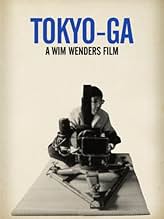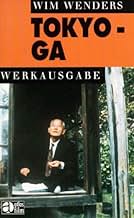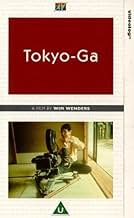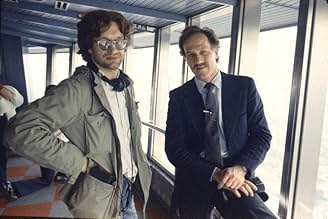IMDb-BEWERTUNG
7,3/10
3888
IHRE BEWERTUNG
Bewegt durch das Werk des Regisseurs Yasujirô Ozu, reist Wim Wenders nach Japan auf der Suche nach dem Tokio, das in Ozus Filmen zu sehen ist.Bewegt durch das Werk des Regisseurs Yasujirô Ozu, reist Wim Wenders nach Japan auf der Suche nach dem Tokio, das in Ozus Filmen zu sehen ist.Bewegt durch das Werk des Regisseurs Yasujirô Ozu, reist Wim Wenders nach Japan auf der Suche nach dem Tokio, das in Ozus Filmen zu sehen ist.
Empfohlene Bewertungen
Wim Wenders attempts to turn his first trip to Japan into a homage to Ozu and an exploration of Japanese modernity, contrasted with the images of a bygone era glimpsed in Tokyo Monogatari.
This is a deeply personal film, an unabashed pilgrimage by Wenders in search of his muse. His rambling narration, impenetrable at times, offers little insight on Japan. What first-time visitor can encapsulate a city as complex as Tokyo? The film works better on the subject of Ozu, the interviews with actor Chishu Ryu and cinematographer Yuuharu Atsuta offering glimpses of Ozu the man behind the icon. They also reveal the affecting power of cinema, both men clearly humbled and moved by the experience of collaborating with Ozu. The bottom line, however, is that this is a film about Wim Wenders, about his nascent stage as a filmmaker and how that came to fruition in the way it did. Fans of Wenders, rather than Ozu or Japanophiles, are the audience for this film.
Technically the film offers up a few gifts, the prime example being a glimpse of the craftsmanship that goes into the making of the ubiquitous wax food in restaurant display windows. Unlike the weekend rockabilly dancers, crowded commuter trains, or oppressive concrete and steel structures, this sequence brings something both long-term residents and those ignorant of Japan will find fresh and illuminating. Unfortunately, elsewhere the film is interspersed with interminable footage of being in a taxi, being in a train, men hitting golf balls... all protracted shots for no other reason than to add a touch of Ozu to the film. A funky, slightly disturbing score helps make these sequences bearable.
Tokyo-Ga is recommended for Wenders fans, and perhaps as nostalgia for anyone who spent a brief time in Japan in the mid-Eighties.
This is a deeply personal film, an unabashed pilgrimage by Wenders in search of his muse. His rambling narration, impenetrable at times, offers little insight on Japan. What first-time visitor can encapsulate a city as complex as Tokyo? The film works better on the subject of Ozu, the interviews with actor Chishu Ryu and cinematographer Yuuharu Atsuta offering glimpses of Ozu the man behind the icon. They also reveal the affecting power of cinema, both men clearly humbled and moved by the experience of collaborating with Ozu. The bottom line, however, is that this is a film about Wim Wenders, about his nascent stage as a filmmaker and how that came to fruition in the way it did. Fans of Wenders, rather than Ozu or Japanophiles, are the audience for this film.
Technically the film offers up a few gifts, the prime example being a glimpse of the craftsmanship that goes into the making of the ubiquitous wax food in restaurant display windows. Unlike the weekend rockabilly dancers, crowded commuter trains, or oppressive concrete and steel structures, this sequence brings something both long-term residents and those ignorant of Japan will find fresh and illuminating. Unfortunately, elsewhere the film is interspersed with interminable footage of being in a taxi, being in a train, men hitting golf balls... all protracted shots for no other reason than to add a touch of Ozu to the film. A funky, slightly disturbing score helps make these sequences bearable.
Tokyo-Ga is recommended for Wenders fans, and perhaps as nostalgia for anyone who spent a brief time in Japan in the mid-Eighties.
the footage is lush and gorgeous, German camera-work of the 70s-80s of the highest caliber. but...the content I found ... appalling! it's been 15 or so years since I saw it and haven't thought about it in a long time, but was just reminded while suffering through this documentary about a feature film called "Jew Süss" ... but my impression of the overall tone is ineradicable . . . I have to admit I'd entirely forgotten the "Ozu love letter" element of the whole thing.
more enjoyable is a documentary about designer Yojhi Yamamoto that I saw at about the same time in this big Wim Wenders retrospective. another film that was a very sweet standout was "A Trick of the Light" about film pioneers whose work was eclipsed by developments of Lumiere in France starring Udo Kier, which I recommend highly.
Wim Wenders...is kind of a shallow filmmaker in my estimation. As with Tokyo Ga I'm sure he had no idea what a potentially offensive film he made. I remember particularly a sequence about some sort of Japanese pinball game that is insanely popular there, his reflections upon which seemed the fruit of a (lack of) intelligence of the sort that characterizes also that cinema excreta "Lost in Translation". the deep meaning of which seems to be "god what a bunch of freaks these Japs are for not speaking English and not modeling themselves after the oh so kewl savvy ironic US population what in god's name is wrong with them?!
more enjoyable is a documentary about designer Yojhi Yamamoto that I saw at about the same time in this big Wim Wenders retrospective. another film that was a very sweet standout was "A Trick of the Light" about film pioneers whose work was eclipsed by developments of Lumiere in France starring Udo Kier, which I recommend highly.
Wim Wenders...is kind of a shallow filmmaker in my estimation. As with Tokyo Ga I'm sure he had no idea what a potentially offensive film he made. I remember particularly a sequence about some sort of Japanese pinball game that is insanely popular there, his reflections upon which seemed the fruit of a (lack of) intelligence of the sort that characterizes also that cinema excreta "Lost in Translation". the deep meaning of which seems to be "god what a bunch of freaks these Japs are for not speaking English and not modeling themselves after the oh so kewl savvy ironic US population what in god's name is wrong with them?!
I love Wim Wenders and most of his films that I have seen. I love and venerate the films of the Japanese master Yasujirô Ozu. 'Tokyo-Ga', the documentary realized in 1985 by Wenders researching the echoes of the works of the great Japanese director 20 years after his death, trying to find what was left of the landscape, characters and spirit of his movies, was of great promise to me. I confess however that one plus one in this case did not make more than two or even equal two. The film, which I have seen in a retrospective of Wenders' earlier movies that started at the local cinematheque slightly disappointed me.
'Tokyo-Ga' is conceived as a travel journal with a definite goal. Wenders tells it in the opening, actually we will hear his voice for the whole duration of the film, even relaying and translating to German what the persons he interviews have to say. He flies to Japan to find what is left of the landscape of Tokyo that inspired the films of Ozu. On the plane he sees a movie and makes an ironic remark about commercial Hollywood movies, while we have a glimpse from ''On Golden Pond' actually not a bad film at all. The film seems to be a chronological journal of his first encounter with Japan. He meets with people who worked with Ozu and interviews them. He films almost everything he encounters - the metropolitan jungle of Tokyo in the 1980s (still looking futuristic even today), kids playing baseball in a cemetery, trains, many trains, Japanese men fascinated with electronic games, young people dancing rock in a park, a factory were the plastic models that represent dishes in Japanese restaurants are created. He meets fellow film makers and discusses cinema and the Japanese landscape with them. Some of the scenes are related vaguely with Ozu's films (the games, the trains). Some other seem completely unrelated. Wenders had come too late in his search. The spirit of Ozu is no longer there, not in the landscape in any case. It's another city, another country, another world. The process of change, of americanization, of fading out of the Japanese culture described by Ozu in his post-war movies had been completed.
I mostly liked the two interviews in the film - with one of his prefered actors and with the camera man. They brought back the personality of the great film maker, and also defined very well the relationship between the film director and his collaborators. The two were keeping for him the respect due to a father and master of his profession. At the same time we get from both the image of a creator who planned every detail of his films rigurously, who knew exactly why and how the film will be made, who had reached the genial simplicity of his expression by rigurous thinking and permanent cizeling of his artistic tools. Wenders' movie 'Tokyo-Ga' is very different, it's almost spontaneous filming as things happen. We can feel the deep respect of Wenders for Ozu, but in order to understand the art of the Japanese master there is no alternative but seeing his films.
'Tokyo-Ga' is conceived as a travel journal with a definite goal. Wenders tells it in the opening, actually we will hear his voice for the whole duration of the film, even relaying and translating to German what the persons he interviews have to say. He flies to Japan to find what is left of the landscape of Tokyo that inspired the films of Ozu. On the plane he sees a movie and makes an ironic remark about commercial Hollywood movies, while we have a glimpse from ''On Golden Pond' actually not a bad film at all. The film seems to be a chronological journal of his first encounter with Japan. He meets with people who worked with Ozu and interviews them. He films almost everything he encounters - the metropolitan jungle of Tokyo in the 1980s (still looking futuristic even today), kids playing baseball in a cemetery, trains, many trains, Japanese men fascinated with electronic games, young people dancing rock in a park, a factory were the plastic models that represent dishes in Japanese restaurants are created. He meets fellow film makers and discusses cinema and the Japanese landscape with them. Some of the scenes are related vaguely with Ozu's films (the games, the trains). Some other seem completely unrelated. Wenders had come too late in his search. The spirit of Ozu is no longer there, not in the landscape in any case. It's another city, another country, another world. The process of change, of americanization, of fading out of the Japanese culture described by Ozu in his post-war movies had been completed.
I mostly liked the two interviews in the film - with one of his prefered actors and with the camera man. They brought back the personality of the great film maker, and also defined very well the relationship between the film director and his collaborators. The two were keeping for him the respect due to a father and master of his profession. At the same time we get from both the image of a creator who planned every detail of his films rigurously, who knew exactly why and how the film will be made, who had reached the genial simplicity of his expression by rigurous thinking and permanent cizeling of his artistic tools. Wenders' movie 'Tokyo-Ga' is very different, it's almost spontaneous filming as things happen. We can feel the deep respect of Wenders for Ozu, but in order to understand the art of the Japanese master there is no alternative but seeing his films.
Tokyo-Ga is a 1985 documentary film directed by Wim Wenders about filmmaker Yasujiro Ozu. Wenders travels to Japan and narrates the movie as he explores the world of Ozu, alternating scenes where he observes Japan and culture with interviews with crew and cast-members from Ozu's films. Wim Wenders says, "If in our century something sacred still existed
if there were something like a sacred treasure of the cinema, then for me that would have to be the work of the Japanese director, Yasujiro Ozu. He made fifty-four films. Silent films in the Twenties, black-and-white films in the Thirties and Forties, and finally color films until his death on December 12th, 1963, on his sixtieth birthday. As thoroughly Japanese as they are, these films are, at the same time, universal. In them, I've been able to recognize all families, in all the countries of the world, as well as my parents, my brother and myself. For me, never before and never again since has the cinema been so close to its essence and its purpose: to present an image of man in our century, a usable, true and valid image, in which he not only recognizes himself but from which, above all, he may learn about himself. Ozu's work does not need my praise and such a sacred treasure of the cinema could only reside in the realm of the imagination. And so, my trip to Tokyo was in no way a pilgrimage. I was curious as to whether I still could track down something from this time, whether there was still anything left of this work. Images perhaps, or even people
Or whether so much would have changed in Tokyo in the twenty years since Ozu's death that nothing would be left to find.
I first went to Japan in 1986 as a high school exchange student. I had been studying about Japan for the past 6 years and was very excited to finally go there to see it in person. Wim Wenders was in a similar situation. He had fallen in love with a particular Japanese film-maker Ozu Yasujiru. Wim had been influenced from an early age by Ozu's work, and he decided to go to Japan while in the middle of making "Paris, Texas." During the break in the making of the film in Los Angeles, Wim boarded a 747 and flew across the Pacific to Tokyo, a place he had never been to before. What we get to see when we watch this film, is not only an interview with the cameraman that worked for Ozu for 25 years, but also Wim's personal discovery of Japan. Much of the film is just straight documentary-type footage accompanied with some pretty weird music. Riding in a taxi at night. Riding in a train at night. Following a little boy who is too tired to walk in the underground shopping mall with his mom, and decides to just sit down. The Cherry Blossom Festival picnics in Tokyo, the dancers at Harajuku on Sundays. A particularly fascinating scene is of a company that manufactures the wax food models you see outside most restaraunts in Japan. Overall, a wonderful film for anyone who loves Japan or is just interested in it. I rate this film among Wim's best works. If you can find it, rent it.
Wusstest du schon
- Zitate
Wim Wenders: It felt good just to look out the window. If only it were possible to film like that, I thought to myself, like when you open your eyes sometimes just to look without wanting to prove anything.
- VerbindungenFeatured in Das Meer das denkt (2000)
Top-Auswahl
Melde dich zum Bewerten an und greife auf die Watchlist für personalisierte Empfehlungen zu.
- How long is Tokyo-Ga?Powered by Alexa
Details
- Erscheinungsdatum
- Herkunftsländer
- Sprachen
- Auch bekannt als
- Tokyo Ga
- Drehorte
- Produktionsfirmen
- Weitere beteiligte Unternehmen bei IMDbPro anzeigen
Zu dieser Seite beitragen
Bearbeitung vorschlagen oder fehlenden Inhalt hinzufügen












